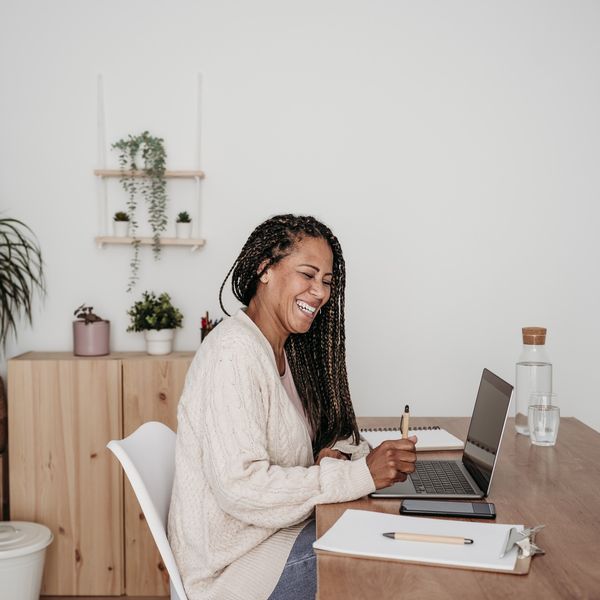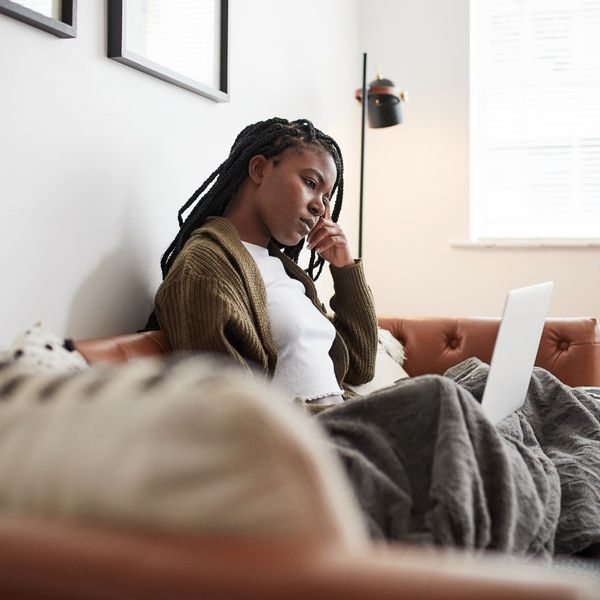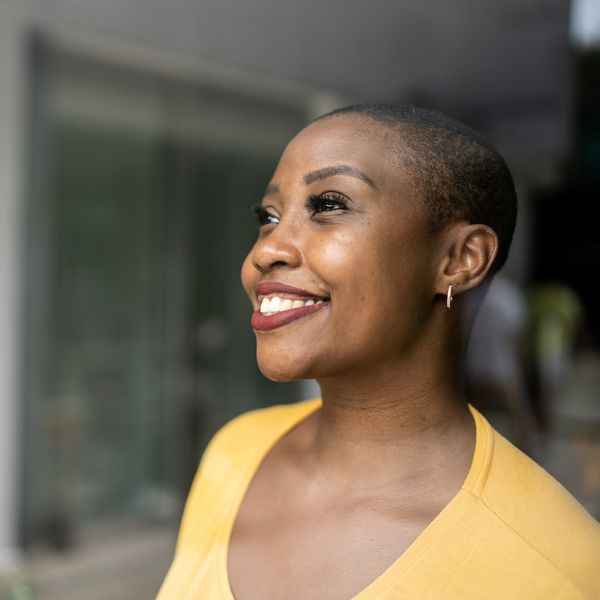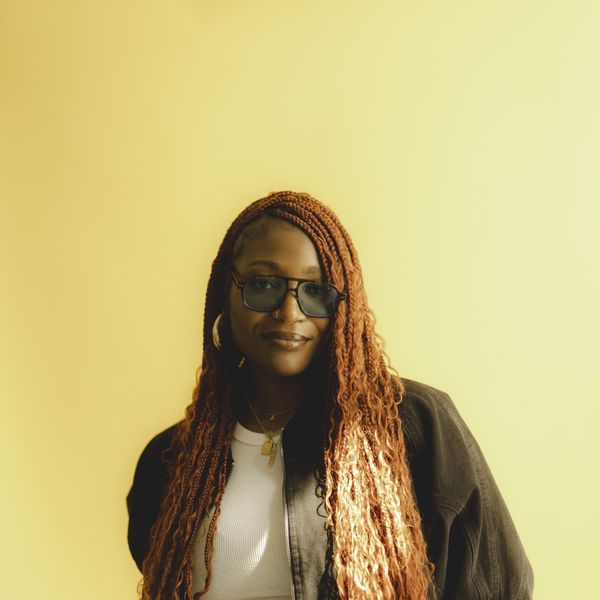"You're not good enough."
"You can't do this."
"You are way in over your head."
Those were just some of the negative statements and thoughts I would say and think to myself as I walked into class. As a 26-year-old Ph.D. candidate at Howard University, my journey in academia has been both exciting and fulfilling yet at the same time, emotionally and spiritually grueling. If the pressure that comes along with being the first in my family to graduate from undergrad, to receive a Master's degree, and pursue a doctorate was not hard enough, the constant feeling of self-doubt and chronic self-criticism of whether or not I "belonged" in higher education was a weight that was too much to bear –– despite my academic and professional accomplishments.
Not being able to put a name to this dark feeling of doubt that consumed me and too intimidated to share my feelings with my other Black female colleagues, I started to do research on what I was going through. After reading the article "For Colored Girls Who Are Unsure" on Sister PhD, I realized what I was battling with. It was called "Impostor Syndrome."
For those of you unfamiliar, Impostor Syndrome is the psychological phenomenon affecting individuals who find themseleves incapable of interanlizing their accomplishments. Instead they view themselves as failures or inadequates, and are living in a constant state of anxiety that they will be found out for the "fraud" that they believe themselves to be. It's quite common among women and people of color.
And unfortunately for us, Impostor Syndrome among Black women academics is a pervasive and debilitating issue that too many of us are suffering in silence with. Following in Audre Lorde's revolutionary charge to "transform silence into language and action," I interviewed five Black women Ph.D. students and they shared with me their experiences with Impostor Syndrome, how they cope with internalized perceptions of inadequacy; and some advice they would give to other Black women doctoral students who too are dealing with inclinations of unworthiness.
Erin Berry-McCrea, 33

The University of Maryland, Baltimore County (UMBC)
How has imposter syndrome impacted you and your Ph.D. journey?
"I think as a Black person, you are always battling with what W.E.B. DuBois describes as 'double consciousness.' You are so used to surviving and dealing with the duality that you become a master at 'saving face.' I was so accustomed to dealing with covert and overt racism; so, I thought dealing with it in the academy was simply part of the territory. I really had an "ah-ha!" moment when a friend from my hometown was killed by the police; my step-father passed suddenly in 2013; and I was taking a research methods class. I felt like I needed to perform some function of myself that I could not as a young scholar because I lost a parent. Death is permanent, and I was not prepared to include that in my life during my second semester as a doctoral student. That is when I realized that my imposter syndrome was bigger than me and almost crippling. I literally had anxiety attacks once a week and thought about moving back to Durham and quitting my program."
What advice would you give to other Black women Ph.D. students who may be dealing with Impostor Syndrome as well?
"I encourage Black women Ph.D. students to be transparent. Keep it 'a band' with yourself and those around you. The SBW (Strong Black Woman) trope is dangerous and it will kill you. Don't fall for it.
Stand in your truth. Do what you can and what you need to do for you and if you need help, ask for it.
Articulate it to those who say that they love you and be specific in what you need. Practice self-care. Prioritize self-care and knowledge of self in the same way that you prioritize meetings with advisors, trips to the library, dissertation writing, and any other academic task. I'd also suggest that you locate a 'tribe' of other 'Ph.D.ers' ––whether it be in person or digitally —so that you can have systems of support."
Ashley Daniels, 32

Howard University
How has Impostor Syndrome impacted you and your Ph.D. journey?
"I remember 2012 being a bittersweet year for me: I was getting settled into living in my first apartment by myself; I scored a great permanent job; and I was starting my first year as a Ph.D. student at one of my dream schools, Howard University. Things were looking good until my fall semester. Thinking that my new work-school balance was going to be like my old work-school balance, I kept my same full-time hours at my new job and took a full load of coursework at Howard. Because of the terrible school-life balance I struggled to maintain, I began to doubt myself and my position in life at the time.
Perhaps Howard and my job made a mistake in taking a chance on me? Was I really as smart as I thought I was?
This kind of thinking did a lot of damage in my first year. I finished my first year on academic suspension; was unconfident in my job performance; and feeling completely beaten down."
What are some ways in which you challenge, overcome and/or cope with your Impostor Syndrome?
"I can clearly remember the times I would walk the hallways of Howard or sit at my office desk and try to fake as many smiles as I could. It wasn't until I came to work one day the summer of 2013 looking as defeated as I felt. My boss — whom I had only known for a few months but was very supportive of my education since we met –– asked me what was going on. I finally broke down and told her everything that I was going through for the past year. However, that was the moment where things began to change. The breaking of my silence led to an adjustment in my work schedule; better advisement on how to be a successful working Ph.D. student; and eventually going to therapy to treat a plethora of issues including anxiety and depression. Six years later, I am proud of the long way I've come to the better physical, mental, and emotional space I am in."
Latoya Haynes-Thoby, 37

Penn State University
How has Impostor Syndrome impacted you and your Ph.D journey?
"Impostor Syndrome was really hard in the beginning to deal with and sometimes it creeps up even now. One of the things that has helped me with my Impostor Syndrome is considering the consequences of not speaking up and talking about it. As a first-generation college student, I have seen how my peers have the support system and can reach out to their family members and close friends who have doctorates; whereas that is not the case for me. I also remember that I am here for a reason and my silence on certain issues won't further the reasons and causes that I am fighting for. I have to remind myself daily that the ideas and things that are important to the groups I belong to won't be heard unless I speak up."
What advice would you give to other Black women Ph.D. students who may be dealing with Impostor Syndrome as well?
"I remember highlighting someone for a project I did for my graduate research and one of the statements he said was, 'Always remember that your voice is important and what you have to say is important.' It wasn't until very recently that I was able to digest that. I hope that other Black women in doctoral programs remember that our voices are important and what we have to say is important. If we risk silencing ourselves, we risk silencing the communities and families we represent. We risk silencing new ideas and people that we are trying to highlight in our work."
Dominiqua M. Griffin, 28

Penn State University
How has Imposter Syndrome impacted you and your Ph.D journey?
"In the beginning of the program and even now, it just feels like 'do I really even matter?' or 'will my work really make a difference?' I always feel as if I am the only person advocating for certain issues, especially in a predominantly white space such as Penn State. I've constantly questioned myself about whether or not I am good enough to be here but I also know that I am not the only person in this predicament either. I recognize there were Black women before me who felt this way and there are going to be Black women after me who will feel this way too –– and they feel imposter syndrome whether they attend predominantly white institutions or historically black colleges and universities. With this, I really have conversations with myself and say, 'I can definitely do this.'"
What are some ways in which you challenge, overcome and/or cope with your Imposter Syndrome?
"While I was at Penn State, I was a part of the Black Graduate Student Association (BGSA) and the Commission on Race, Ethnicity, and Diversity. That was really helpful. Being able to advocate for students of color; students with disabilities; and advocating for mental health and wellness and how Black students need counselors of color on campus, really helped me because I felt heard and valued. It was great to be around fellow graduate students who looked like me and who also were going through the same issues as me and being able to talk about our issues collectively really encouraged me."
Ree Botts, 25

UC Berkeley
@reeciology + @theselfologymovement
How has Impostor Syndrome impacted you and your Ph.D. journey?
"My Impostor Syndrome started when I was an undergraduate at Spelman. My sophomore year, I was in a program called the Mellon-Mays Fellowship, which is a program that serves as a pipeline for undergraduate students who are interested in getting their Ph.D. At the time, I did not know if the program was what I wanted to do but with the encouragement of one of my favorite professors, I applied. I was so surprised that I was accepted into the program because I did not think I was smart enough. I felt like I didn't belong. I remember the first day of the program when everyone was making their introductions and I was really nervous because I was afraid they would judge me because of my Philly accent. I did not want people to think that I was 'ghetto' or 'stupid' because I did not talk the way they did. I used to question myself and wonder how can I be a scholar and yet an 'around-the-way' Philly girl and try to exert my confidence? I thought I had to pick a world to belong to but then I realized that I can be and do both."
What advice would you give to other Black women Ph.D. students who may be dealing with Impostor Syndrome as well?
"You deserve everything you worked hard for. Nobody made a mistake on you. Nobody accidentally let you slip in. There are a lot of unqualified people with doctorates, who have gotten through their programs because of their privilege. You have the power to create the life you want to live. Don't let your professors or these institutions have power over you.
Stay true to yourself and know that you don't have to put up with the bullshit.
You are a student at your institution and you have rights. You do not have to endure pain and trauma to get a degree. The moment you start making decisions for you and the moment you realize there is more to life –– your life –– outside these institutions and a degree is the moment you will be set free."
Have you ever encountered Impostor Syndrome? What steps are you taking to overcome those feelings?
- The Five Types Of Impostor Syndrome And How To Beat Them ›
- Learning to Deal With the Impostor Syndrome - The New York Times ›
- How to Overcome Impostor Syndrome: 21 Proven Ways ›
- Impostor Syndrome: How to fight the feelings you're a fake - CNET ›
- Afraid Of Being 'Found Out?' How To Overcome Impostor Syndrome ›
- How to Get Over Imposter Syndrome - The Muse ›



























